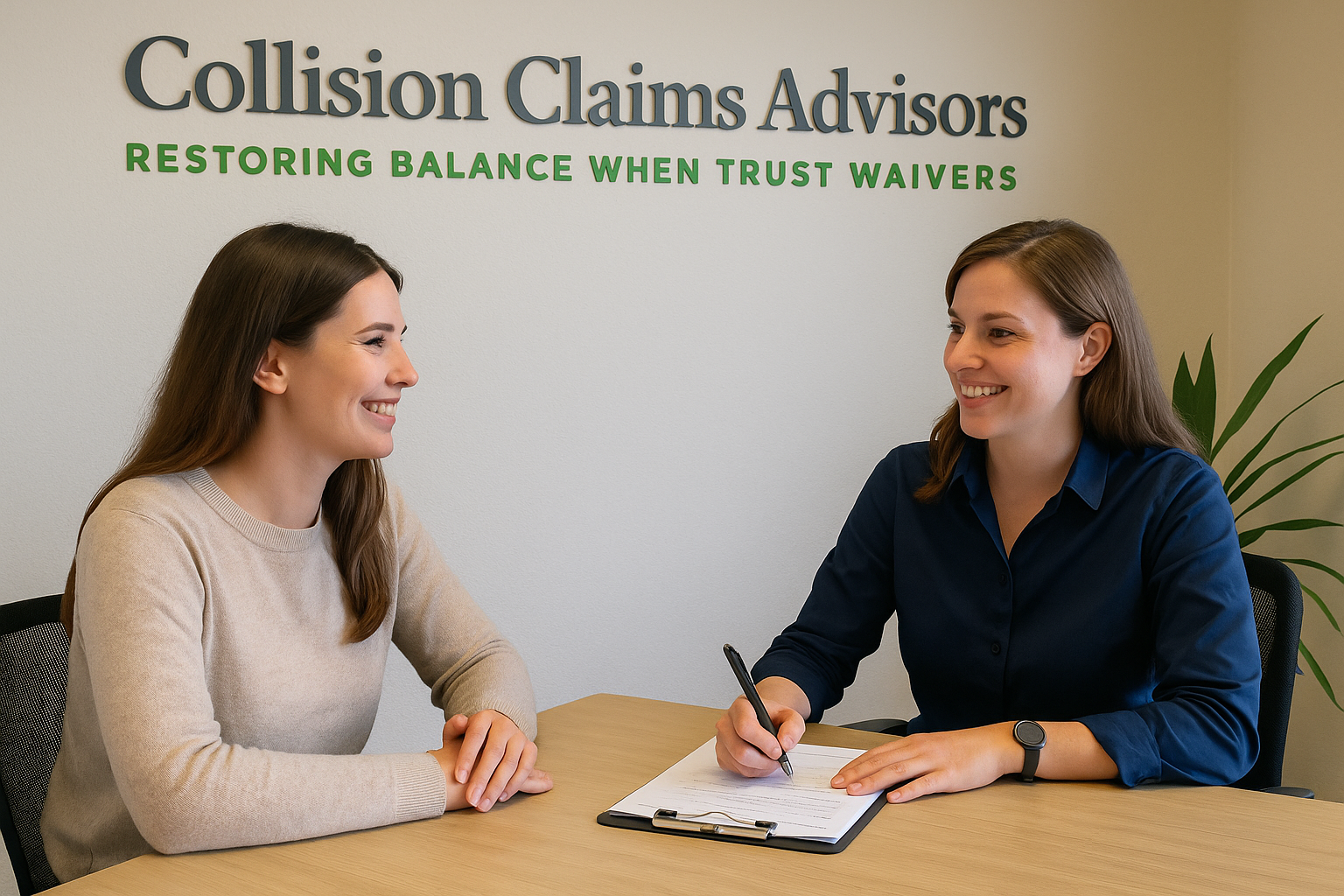
Did you know your insurance company is counting on you not getting a total loss appraisal? Without one, you could be settling for far less than what it actually costs to replace your vehicle—leaving you financially vulnerable.
A certified total loss appraisal gives you documented proof of your vehicle’s true Actual Cash Value (ACV) before you accept any offer. This matters—especially in states like Arizona, where the insurer must also cover taxes, title, license, and doc fees when properly documented.
Don’t settle short. Schedule your free consultation with an IACP Certified Appraiser today and claim what you’re truly owed.
Schedule Your Total Loss Appraisal and Protect Your Payout
Total Loss Appraisal Services You Can Trust
Certified ACV Appraisal – Report Only
A certified appraisal of your vehicle’s Actual Cash Value (ACV) for use in a total loss claim. Designed for claimants who do not have (or cannot use) the appraisal clause in their policy, but want peace of mind of what their vehicle is worth.
$ 325.00
USPAP-compliant ACV report
Market data and price guide references
Delivered via PDF
No negotiation or settlement support included
Upgrade Option: If you later choose to proceed with a Right to Appraisal (RTA) process, this fee will be credited toward the $500 RTA package.
Certified ACV Appraisal – RTA & Negotiation Support
A certified appraisal of your vehicle’s ACV plus full support in exercising your Right to Appraisal under your insurance policy. Best for first-party claims where the appraisal clause is available.
$ 500.00
USPAP-compliant ACV report
Market data and price guide references
Negotiation with the opposing adjuster
Assistance with umpire selection per policy terms
Email/phone updates throughout the process

Total Loss
Navigating a Total Loss Claim: What You Need to Know
Has your vehicle been deemed a total loss, or are you concerned it might be? If so, you're likely facing a stressful and confusing process that can impact your finances and disrupt your daily life. At Collision Claims Advisors, we're here to help you understand your rights, protect your interests, and confidently navigate your total loss claim from start to finish.
Step 1: Review Your Insurance Policy
Before you do anything else, take time to carefully review your insurance policy. This document outlines what's covered, what's excluded, and your rights as a policyholder. To date, most policies don’t restrict you to use specific repair facilities. In fact, Arizona and most other states are "Right to Choose" states, meaning you're legally allowed to select the repair facility of your choice without penalty.
Insurance companies often try to steer consumers toward their Direct Repair Program (DRP) shops, which have agreed to limit charges in exchange for steady work. If you choose a non-DRP shop, those limitations do not apply—even if the insurer tries to enforce them. Your policy likely contains no language restricting your benefits based on where you take your vehicle. Unlike medical insurance, there is no “in-network” vs. “out-of-network” designation.
Step 2: Know What Charges Are Covered
While the language in your policy may vary, it’s important to understand that in a total loss claim, your payout typically covers several distinct components:
Actual Cash Value (ACV) – The fair market value of your vehicle immediately before the loss, based on comparable sales and adjusted for mileage, condition, and options.
Supplementary Payments – Additional costs directly related to the loss, such as towing and storage charges.
Aftermarket or Custom Equipment – Often limited by policy (commonly capped at $1,000 unless you have purchased additional coverage).
Loss of Use – Compensation for transportation expenses while you are without your vehicle, if provided by your policy or required under state law.
Although ACV seems straightforward, the value of the vehicle, leaving the other elements of the loss to be settled on their own merit, many insurers actively look for ways to reduce their financial exposure on total loss claims. Increasingly, they are pushing back on charges like storage, administrative fees, and other “advanced” expenses. At the core, they are still negotiating the loss—but the tactics can sometimes border on unethical or feel like intimidation. For example, an insurer might claim you are responsible for certain charges simply because you chose a particular repair facility. In reality, unless your policy explicitly excludes them, charges such as storage, admin fees, and gate fees are generally covered.
That said, you may still be contractually responsible for those charges to the repair facility itself. If the insurer refuses payment and your vehicle remains on-site, these fees can accumulate quickly—leaving you personally liable.
While it may be tempting to hold the vehicle until you agree with the settlement, doing so can put you at financial risk. As the vehicle owner, you have a duty to mitigate costs. To protect yourself, consider:
Collision Center Communication – Is the shop helping to minimize charges and providing clear, documented communication about storage, admin, or other fees?
Relocation Options – Can you move the vehicle to a no-cost location, such as your home or storage building? This can either prevent or minimize additional charges, though any current balance would still need to be resolved first.
Policy Requirements – Does your policy outline a duty to mitigate? Often, simply making the vehicle available for pickup in writing—without accepting the settlement—satisfies this obligation.
You’re not conceding to their offer; you’re protecting your position. By making the vehicle available, you place the responsibility back on the insurer. If they delay pickup after that point, they may be liable for any additional fees incurred.
Step 3: Research the True Actual Cash Value (ACV) of Your Vehicle
Many insurers present a settlement figure with little to no breakdown. In Arizona—and in most states—you may be entitled not only to the Actual Cash Value (ACV) of your vehicle, but also to taxes, title, license, document fees, and other associated costs. This is why it’s critical to know your true ACV before accepting any offer.
Avoid relying solely on resources like Kelley Blue Book, which reflect national averages and dealer-based pricing rather than your local market. Instead:
Search local dealership listings for vehicles similar to yours—ideally 2 to 3 comparable vehicles within a 50-mile radius.
Gather maintenance and service records to demonstrate your vehicle’s condition.
Include recent upgrades such as new tires, fresh paint, or major repairs.
A well-documented vehicle history can significantly strengthen your valuation.
If you want independent confirmation, you also have the right to obtain a certified appraisal, which can be used to support your claim and challenge an insurer’s offer.
Step 4: Review and Respond to the Settlement Offer
Insurance companies often make quick offers to avoid ongoing daily charges.
You have the right to take your time and review any offer carefully.
If the number seems low—and it often is—negotiate. Share your research, request a detailed breakdown of how the offer was calculated, how it applies to the policy, and question any missing amounts for taxes or fees. However, be aware that insurers may attempt to:
Deduct advance charges from the ACV (fees incurred at your collision center that had to be paid prior to removing the vehicle to a salvage yard).
Dispute certain shop fees outright.
Apply pressure to settle quickly- This offer is only available through today.
Don’t let these tactics rattle you. This is a leverage game: their goal is to pay as little as possible; your goal is to recover what you’re rightfully owed.
Key Point: Settlement offers do not “expire.” Claims must be resolved, so stay calm, stay informed, and respond strategically.
That being said, depending on your state’s laws, the insurer may be required to release any undisputed amount while negotiations continue. This prevents them from holding your entire settlement hostage.
Example:
If you’re offered $20,000 but believe your claim is worth $25,000, the $20,000 could be considered undisputed. You can, in writing, request that the insurer release that amount immediately while you continue negotiating the remaining $5,000. Make sure you clearly state that accepting the undisputed funds does not mean you are closing or waiving your claim for the balance.
Step 5: Understand the Risks of Retaining Your Vehicle
If the insurance company offers owner retention or suggests that you are required to keep your totaled vehicle, understand this: you are not obligated to retain it.
If you do choose to keep your total loss vehicle, proceed with caution. Once you accept the settlement, you may still owe the collision center outstanding charges—such as storage, administrative, or gate fees.
If these fees remain unpaid, the shop can legally refuse to release your vehicle. This puts you in a difficult position—holding a reduced settlement while having no access to the car. Worse, if the vehicle is left behind, you could face legal and financial repercussions. For example, in Arizona, abandoning a vehicle is illegal and carries additional liabilities.
Before accepting a retention offer:
Carefully review the repair shop’s service agreement to fully understand your financial obligations.
If your plan is to repair the vehicle, research your state’s requirements for re-licensing a total loss vehicle.
Factor in the full cost of repairs, inspections, and potential hidden damage.
The key point: if repairing the vehicle made strong financial sense, the insurance company likely would not have declared it a total loss in the first place.
A Note for Claimants
While much of this applies to both policyholders and third-party claimants, claimants often face more limitations when there’s a disagreement. That doesn’t mean you’re without options.
You can obtain a certified appraisal to independently establish your vehicle’s ACV.
The insurance company is obligated to review and investigate all credible evidence you provide.
If negotiations stall and you feel unsupported, you may consider switching to a first-party claim where, if needed, you can rely on the policyholder protections built into your own coverage.
You always have the right to seek legal counsel if needed.
Final Thoughts
Insurance companies may use tactics that feel like intimidation—but your policy is a legal, binding contract. Know what it says. Know your rights. And don't be afraid to push back.
You also have the right to demand a written explanation of what is or isn’t covered, and what policy provisions apply to your situation. If you disagree with the offer and your policy includes an appraisal clause, you may have the right to hire a certified, independent appraiser to remove bias and bring in an impartial perspective.
At Collision Claims Advisors, we review policies, support negotiations, and help both consumers and repair facilities hold insurers accountable. If you're unsure how to move forward, schedule a consultation—we’re here to help you make informed, confident decisions.
What Our Clients Are Saying
At Collision Claims Advisors, we believe trust is earned—and our clients say it best. From first-time claimants to seasoned repair professionals, our 5-star reviews speak to the care, clarity, and results we deliver every day.
⭐️⭐️⭐️⭐️⭐️
“I had no idea I was entitled to diminished value until I found Collision Claims Advisors. Charlie walked me through the entire process and helped me recover over $5,000 I would’ve left on the table. Highly recommend!”
— Amanda R., Phoenix, AZ
⭐️⭐️⭐️⭐️⭐️
“Professional, fast, and incredibly knowledgeable. I was overwhelmed dealing with the insurance company until I brought in Charles. His appraisal and support made all the difference.”
— Jason M., Chandler, AZ
⭐️⭐️⭐️⭐️⭐️
“I didn’t even know what diminished value meant. After one call, I understood my rights and had a clear plan. Charles truly cares about his clients.”
— Robert T., Gilbert, AZ
⭐️⭐️⭐️⭐️⭐️
“I work at a body shop and send customers to Collision Claims Advisors all the time. They’re honest, quick, and always deliver. Great resource for anyone dealing with a total loss or DV claim.”
— Tony S., Scottsdale, AZ
Contact one of our Experts
Understandably, each situation is a bit unique and you likely have many questions, and perhaps feel overwhelmed. That’s okay, we are here to help. Feel free to reach out via email with any questions you may have, or if you prefer, you can schedule a free consultation call below. One of our advisors will be happy to assist you.
Email; Info@collisionclaimsadvisors

